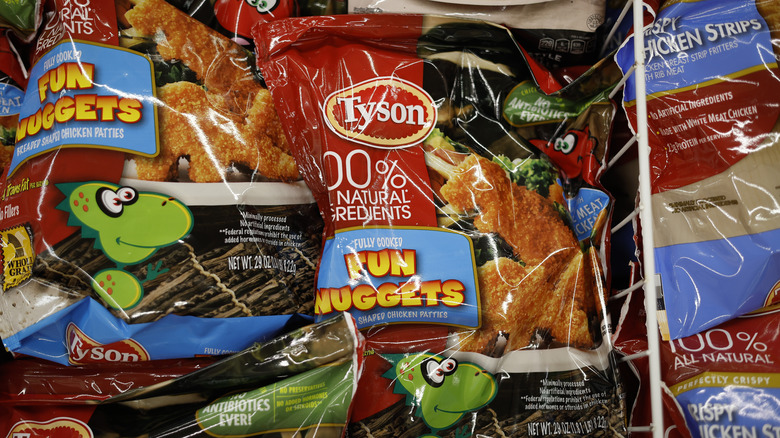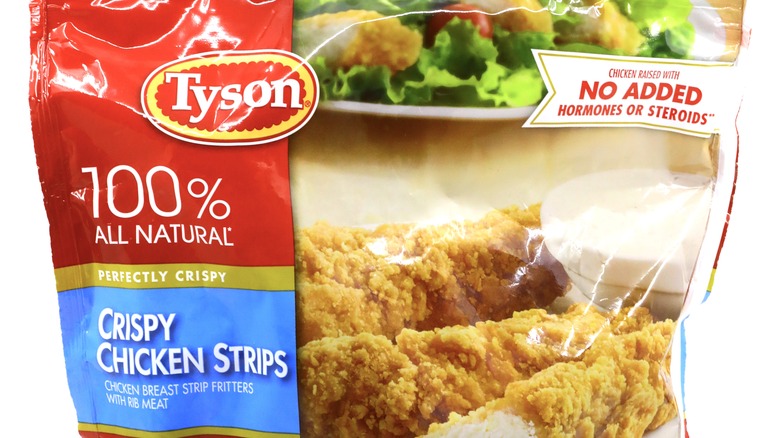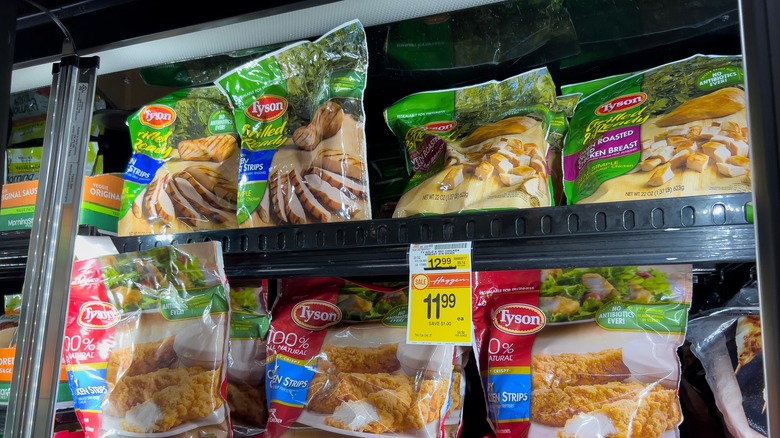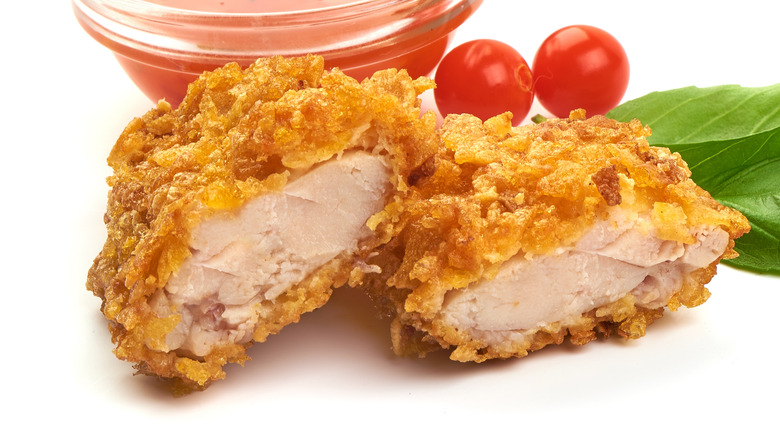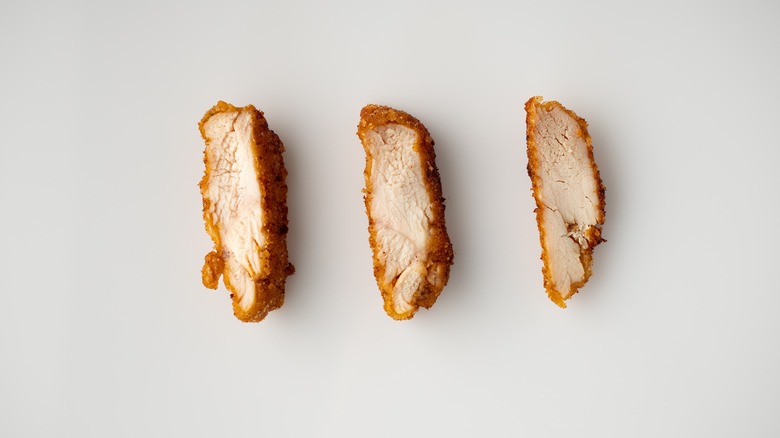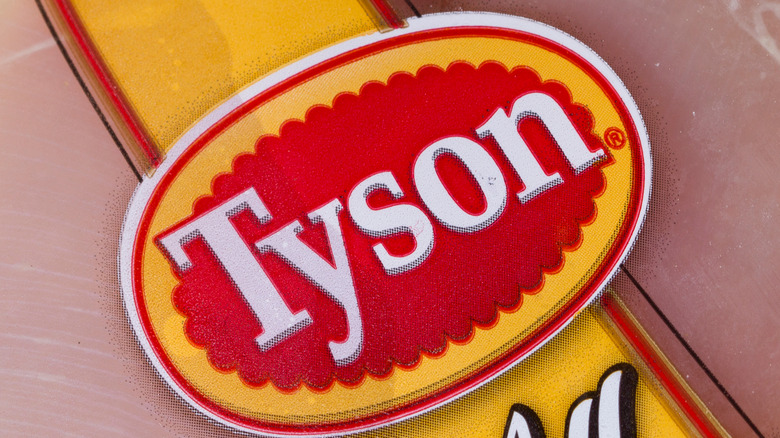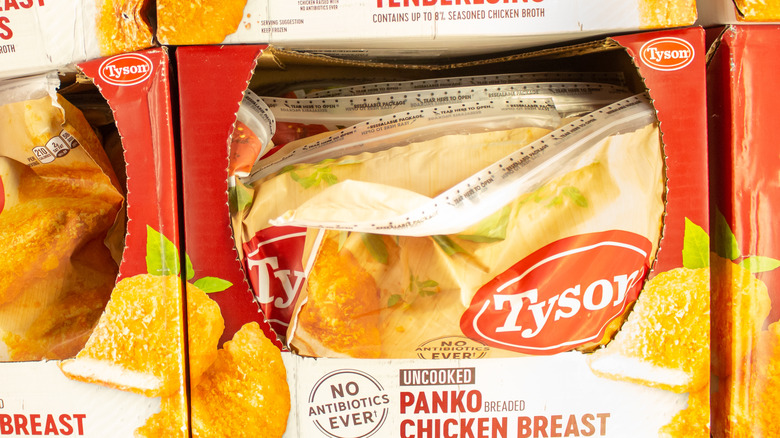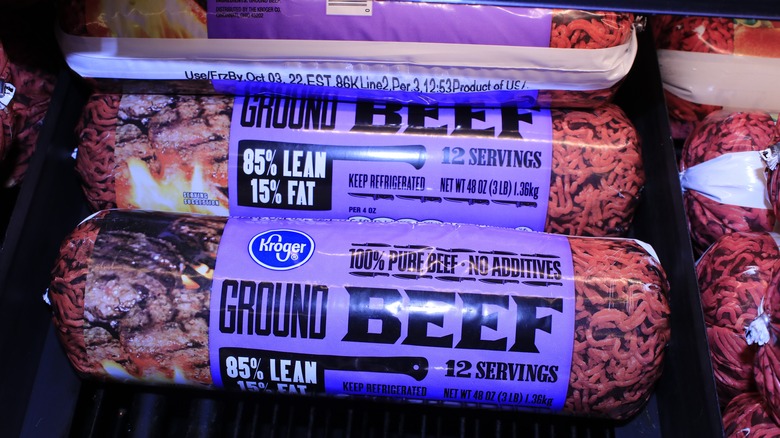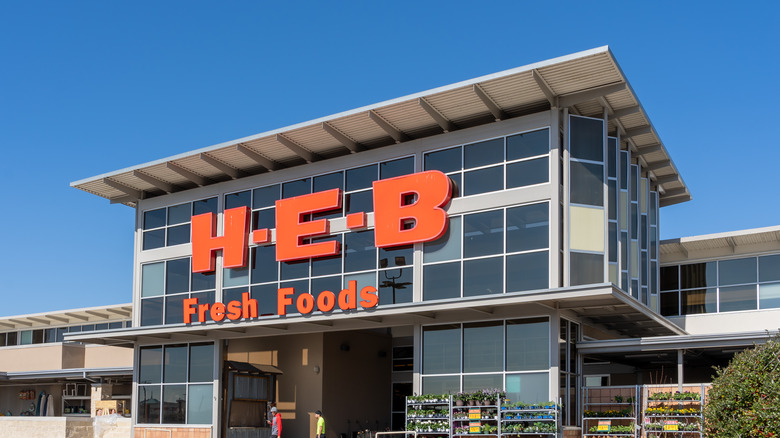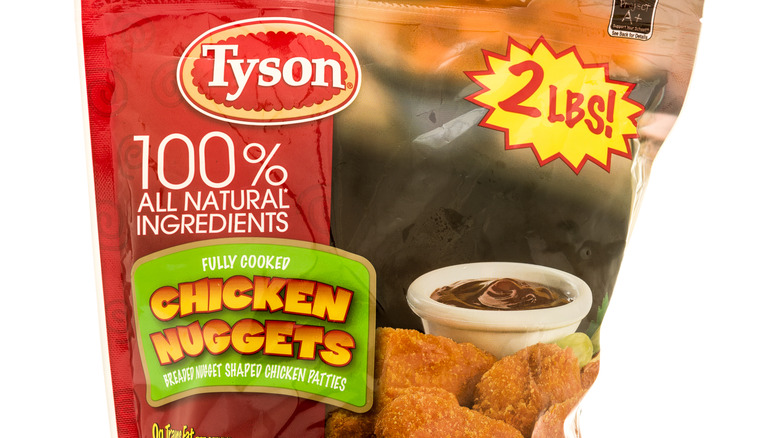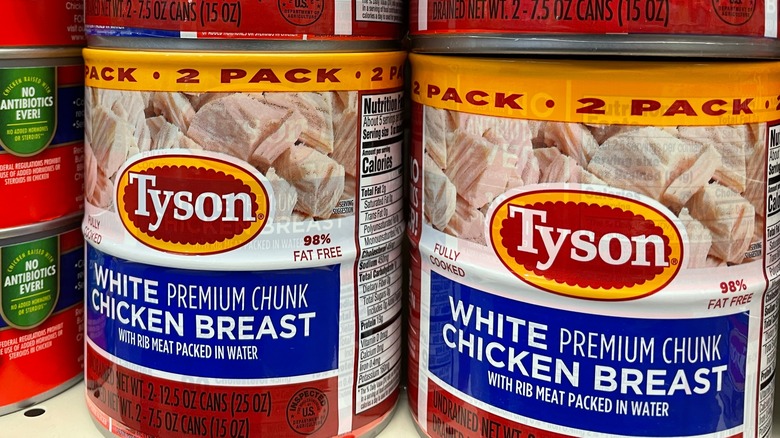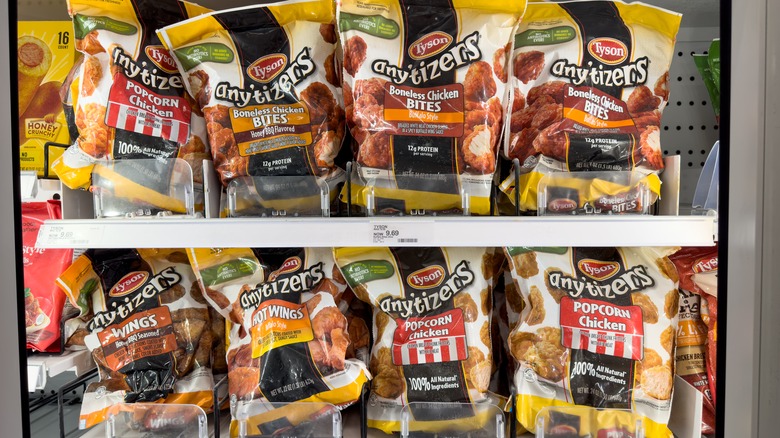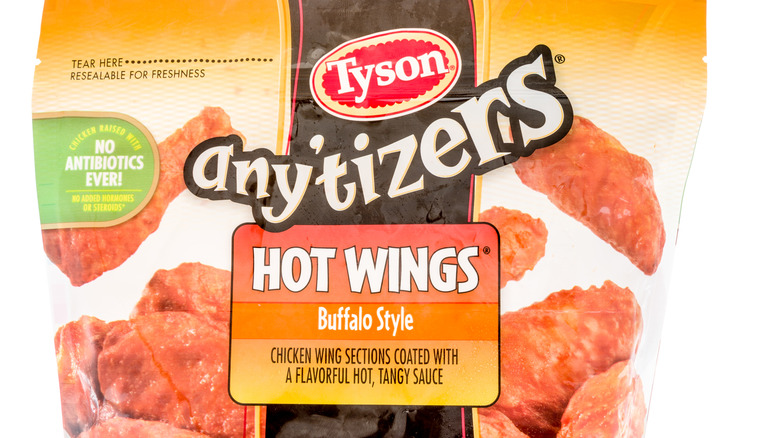The Biggest Recalls In Tyson Foods' History
Unpleasant as they may be, the truth is that recalls are a fact of life in the food industry. Yet some companies seem to be hit with recall after recall, perhaps never really getting to a point where their name isn't in the news for that reason. This is especially true if the company involved is a big one with lots of products that use ingredients sourced from other suppliers, which increases the complexity of the process and introduces more opportunities for something to go wrong. Tyson Foods is apparently one of those companies. It's so big and has so many associated brand names and major customers (Tyson provides most of the chicken used at several fast food chains) that recalls seem to hit the company frequently.
One of the more recent recalls that Tyson Foods has had to deal with is a limited recall of almost 30,000 pounds of dino-shaped "fun" nuggets, which may contain metal pieces. Then, there was over 15,000 pounds of Hillshire brand smoked sausage that may contain bone fragments (Tyson Foods owns several familiar brands, including Hillshire Farms). Those sound like large amounts of food, but they're actually kind of small compared to other recalls. The truth is that Tyson Foods has had to deal with some whoppers before all this, which make those dino nugget and sausage recalls seem positively tiny. Here's a look at the biggest recalls in Tyson Foods' history.
11,829,517 pounds of frozen chicken strips in 2019
Tyson Foods had to recall some chicken strips in 2019. At first, it seemed like a fairly limited recall, with only an estimated 69,000 pounds of strips subject to the recall. A couple of consumers had alerted the company to metal in the chicken strips. That's not good, of course, but the amount recalled was not that much bigger than other recalls the company had dealt with before.
However, the USDA soon issued a revised recall notice that likely made more than a few people do a double-take. The number of pounds under the recall expanded to include 11,760,424 additional pounds of food, for a total of 11,829,517 pounds. The number of complaints went up to six, while the USDA's Food Safety and Inspection Service (FSIS) said three of those complaints included mouth injuries. One more revised recall notice stated that the affected products had been shipped overseas, as well. The recall was so urgent that the FSIS declared it a Class I recall, meaning the ingestion of the affected foods could result in injury or even death (though no deaths were reported in this case).
8,955,296 pounds of ready-to-eat chicken products in 2021
In June 2021, the FSIS received reports of two people who had been infected with listeriosis, a form of food poisoning. An investigation revealed the source of the problem to be a Tyson Foods factory, so a recall was issued for products made at that location. The affected batches totaled 8,492,832 pounds of ready-to-eat chicken products at first, though the amount recalled was revised to 8,955,296 pounds a month later. A second revision (the third notice at this point) was issued to alert customers that the affected products may have been served at deli counters and may have had different identifying numbers.
This was a particularly bad recall, not just because of the numbers, but because the FSIS received word of an additional illness and a death allegedly linked to the products. Also, those products had been distributed not only to supermarkets but to many institutions, even fast food restaurants. Some products actually made it into school systems, although the products were not part of food acquired by the USDA for the National School Lunch Program.
2,485,374 pounds of ready-to-eat breaded chicken products in 2017
Tyson Foods' largest recalls typically concern ready-to-eat items and the third largest is no exception. However, in this case, the recall wasn't actually Tyson Foods' fault. Instead, a supplier had alerted the company to undeclared milk in the breadcrumbs used in some breaded products. The recall was issued because milk is a potential allergen, although Tyson hadn't received any reports of allergic reactions related to this incident. A total of 2,485,374 pounds of different breaded products were recalled.
Plenty of breaded products contain milk, so why the fuss? It's due to the fact that it wasn't marked on the package. People who are allergic to milk rely on packaging to alert them and if there's no warning — and especially if the product is one they've used before without a problem — then they aren't necessarily going to suspect anything is wrong with the product. That could result in allergic reactions and injury. Interestingly, in this recall, Tyson had the option to use the affected products; after all, they would have been okay to sell if the company had labeled them correctly. However, Tyson instead opted to discard of all the products.
2.3 million pounds (approximate) of cooked chicken products in 2001
If you've ever wondered if your fully cooked chicken products were actually cooked through, you might not want to read this next section. Back in 2001, Tyson had to recall about 2.3 million pounds of cooked chicken products because customers had complained the chicken was underprocessed. In other words, they alleged that it was undercooked. That's not something you want to find when preparing a cold chicken salad, as raw chicken can be the source of dangerous pathogens such as salmonella.
What happened was that the company's cooked tenderloins and breast strips were processed in such a way that larger pieces may have overlapped with other pieces or become folded, resulting in undercooked spots. If you've bought fully cooked chicken in bags before for use in things like salads and sandwiches, you know those pieces aren't necessarily reheated — and they're often used with little inspection. So, it's vital that these fully cooked pieces are properly processed at the factory, from cooking to cooling. Thankfully, Tyson hadn't received any reports of illness due to the undercooked pieces, likely in part because the problem was restricted to one processing plant.
380,000 pounds of deli meat in 2010
Tyson Foods may be widely known for its chicken products, but it also owns other subsidiary brands that focus on different meat products. One of those companies is Zemco Industries, which produces deli meat. In August 2010, Zemco recalled 380,000 pounds of deli meat that had been used in ready-to-eat sandwiches sold at Walmart under the store's Marketside brand. The deli meat was potentially contaminated with Listeria monocytogenes, sometimes a culprit in serious cases of food poisoning. Luckily, no illnesses were reported in this case, although the problem was discovered after an inspection found contaminated meat in a sandwich at a Georgia Walmart.
In October 2010, the USDA suspended operations at Zemco's processing plant in Buffalo, New York. The suspension, which was temporary but still led to a layoff of 480 people, was supposed to give Zemco time to address the problems that led to the contamination in the first place. This was the fifth such incident at the plant since Tyson acquired it in 2001.
190,757 pounds of ready-to-eat chicken fritters in 2019
Recalls tend to fall into certain categories that include issues like undeclared allergens, pathogen contamination, and the inclusion of foreign matter. In 2019, 190,757 pounds of ready-to-eat chicken fritter products fell into the third group, as complaints alleged that they could have contained bits of hard plastic. Schools had bought these fritters to use in lunches, although the USDA was clear that the fritters were not part of what the USDA usually distributed for national school lunch programs. Three different schools complained about the plastic after purchasing the products.
USDA officials were also concerned that the contaminated product could have ended up in other food service locations. The USDA's page for the recall says the administration recovered only 3,905 pounds of product. However, it's possible that some purchasers simply threw out the products without trying to return them to sellers or to the USDA.
132,520 pounds of chicken nuggets in 2016
Tyson had previously had another problem with plastic debris ending up in its products in 2016. The company issued a recall for 132,520 pounds of Panko Chicken Nuggets that were sold under both the Tyson name and under another brand owned by the company, Spare Time. The Tyson bags were sold via retail establishments and the Spare Time bags were bulk bags meant for institutional use. As with other foreign matter recalls, Tyson learned about the problem from consumers who found non-food materials in their products.
In this case, Tyson actually had an idea of where the plastic came from. It said that the nuggets may have picked up the plastic from a rod that connected a transfer belt in the manufacturing facility. Consumers were asked to discard the product or return it for a refund instead of trying to eat anything that appeared to be uncontaminated. The USDA considered the contamination to be so unsafe that the recall was categorized as Class I, indicating that consuming the product could lead to injury or death (though no known health effects were connected to this recall).
131,300 pounds of ground beef products in 2011
Tyson Foods also owns Tyson Fresh Meats, which the larger company formed when it bought Iowa Beef Packers (IBP) in 2001. The subsidiary had to issue a recall notice in 2011 for 131,300 pounds of ground beef products after E. coli O157:H7 was found to be the culprit behind a wave of infections in Ohio. Investigators collected leftover ground beef from the homes of the people who had gotten sick and determined that the Tyson Fresh Meats brand was the source.
However, these products weren't sold under the Tyson name. They'd been sold under the Kroger and Butcher's labels in stores, as well as under a generic brand name. And though the issue came to light in Ohio, the meat had been packed and sent to stores in several states. The USDA's page for the recall states that only 18 pounds of the products were recovered, so hopefully the rest was just thrown out.
127,000 pounds (approximate) of uncooked breaded chicken products in 2013
Tyson issued a recall notice in 2013 for 127,000 pounds of uncooked breaded chicken tenderloins that had been sent to institutional and commercial kitchens under the Spare Time and Tyson labels. The problem was an undeclared allergen that escaped detection due to a product label change.
More specifically, the marinade in the product had been reformulated and contained soy protein, though the product's packaging hadn't been updated to alert consumers of the new ingredients list. That's a big problem for anyone with a soy allergy, especially considering soy is one of the major allergens that has to be listed on labels in the U.S. This time, the company found the problem before any consumers reported it and there weren't any known cases of illness, either. What's more, the products weren't sent to stores for retail sales. The USDA recovered over 65,000 pounds of product.
93,697 pounds of fresh meat in 2022
Tyson again had to deal with meat contaminated with foreign matter in 2022, only this time it was due to an unidentified mirror-like material that had been found in products. The recall involved three specific sizes of ground beef chubs (beef sold in tube form) that were sold under the H-E-B and Hill Country Fare brand names at H-E-B stores in Texas. Consumers told Tyson Fresh Meats that they'd found this material in the beef they'd purchased.
One of the USDA's main concerns was that people might have had these chubs stored in their freezers and not realize that there was a recall targeting the products. As you can guess, the inedible — not to mention mysterious — nature of the material made this recall a priority and garnered it a Class I designation. Tyson and the USDA worked to alert as many consumers as possible, along with ensuring that all affected stores removed the product from shelves as quickly as possible. Consumers were told to discard the meat or return it at the store.
75,320 pounds of cooked chicken nugget products in 2014
Tyson weathered yet another recall in 2014 due to plastic contamination; however, this was one of the worse ones in terms of effects on consumers. Ultimately, about 75,320 pounds of cooked chicken nuggets had to be recalled because consumers found small plastic bits in the products. Even worse, some people reportedly sustained mouth injuries from eating the contaminated chicken nuggets. The FSIS and Tyson called the injuries minor and the FSIS didn't have additional reports of injury beyond the original group whose reports kicked off the recall.
The plastic apparently came from a scraper that was dropped or left inside a blending machine at a processing plant. The company found that only one production line was affected. The nuggets sold under the Tyson brand were sent to Sam's Club, while the nuggets sold under the Spare Time brand were sent to institutions that may have included correctional facilities, hospitals, and schools.
70,500 pounds of canned beef mislabeled as chunk chicken in 2012
Tyson sometimes has products packed by another company, and if that company makes a mistake, then it and Tyson both have to recall the product. That happened in 2012 when Tony Downs Foods Company issued a recall notice for food it had canned for Tyson. The company packed cans with a beef product and then labeled the cans as chunk chicken. The product was fully cooked and safe for people to eat, but it probably was very annoying to consumers who thought they were purchasing chicken only to find beef instead. The company found out because consumers complained.
One other issue was that the beef contained wheat, which is one of the major allergens that has to be noted on product labels. The label didn't say there was any wheat in the product (the chicken didn't contain any), so the company also recalled the products because of the undeclared allergen. The USDA noted that cans of chicken with certain manufacturer codes had been packed correctly and weren't part of the recall.
67,269 pounds of boneless chicken wings in 2012
This original recall led to two stores issuing their own separate recalls ... but the store recalls didn't address half of the original recall. The original recall concerned 67,269 pounds of two Tyson products, Fully Cooked Boneless Chicken Wyngz Buffalo Style and Tyson Any'tizers Boneless Chicken Wyngz Honey BBQ Flavored. The issue: some bags of the BBQ product contained the Buffalo version by mistake. That BBQ packaging didn't indicate the presence of the major allergens milk, soy, and eggs, which were present in the Buffalo version. The products were recalled for mislabeling and misbranding. No illnesses were reported as a result of the mix-up.
Both Giant Food Stores and Martin's Food Markets issued their own recalls for the products shortly thereafter. However, the reason given addressed only the lack of allergen labeling. Given that the original recall was initiated when consumers complained about the product mixup, you'd think the other recalls would have mentioned that part, too.
52,486 pounds of fully cooked hot wings in 2015
The last recall on our list is kind of an alarming one. In 2015, Tyson recalled 52,486 pounds of its Any'tizers Buffalo-style hot wings because several consumers reported that the product smelled weird. Even more alarming were multiple reports of illness related to the wings, although whether or not the wings truly caused the illness was unconfirmed. However, Tyson wasn't going to take chances and listed the cause of the recall as potential adulteration of the product. The company spread the word through national media and, according to the USDA's recall page for the product, 32,047 pounds of the wings were recovered.
The Buffalo-style hot wings had been distributed to retail locations across the nation. However, Tyson said only that one variety of hot wings had been affected, so other chicken wing products were presumably safe to eat. The affected products were made at the company's processing facility in Pine Bluff, Arkansas. As far as we could find, no cause for the strange odor was ever identified or at least publicly announced.
